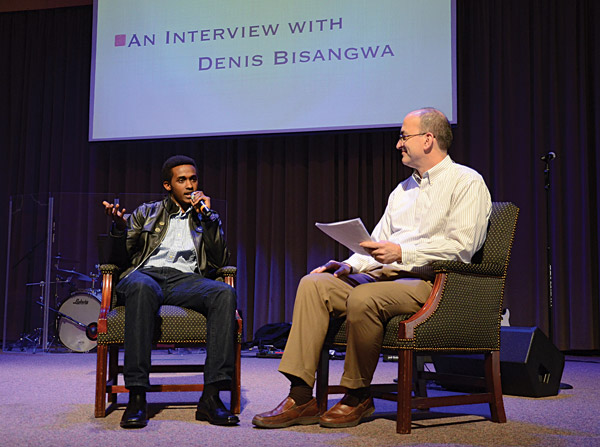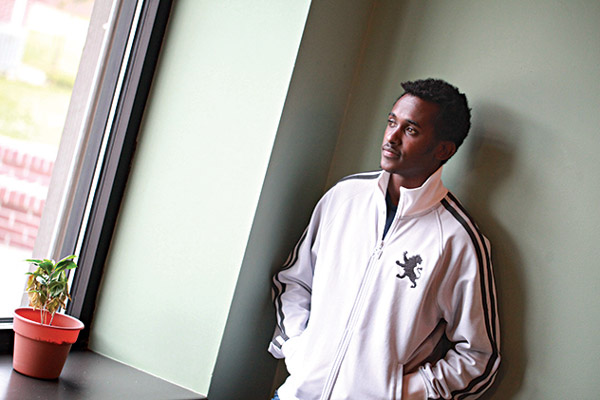Issue: Summer 2013 | Posted: June 5, 2013
Healing Rwanda
Union student wants to help his homeland

Denis Bisangwa, a sophomore business administration major, was seated on the stage of the G.M. Savage Memorial Chapel, ready to answer questions about his life.
It was a situation that many students might have found frightening. But Bisangwa has told his story many times, and it captivated the Union audience.
This Union student is a Rwandan orphan who survived genocide and civil war in his homeland. He plans to return to the African nation with messages of hope.
He says that hope is rooted in the power of the gospel to bring about forgiveness. George Guthrie, Benjamin W. Perry Professor of Bible, interviewed Bisangwa for the Culture Fest chapel service in March. The chapel celebrated cultures represented at Union and unity of the church around the world.
Guthrie said he asked Bisangwa to be part of the Culture Fest chapel because of his unique set of life experiences and perspective growing up in a country that has seen much trouble.
“The church here needs encouragement and the church there needs good teaching,” Bisangwa said.
Bisangwa explained that his father, a Rwandan soldier, died at the beginning of the 100-day genocide in 1994, when Bisangwa was only 5 years old. Only a few years later, his mother died as well. He and his siblings lived with their uncle, where Bisangwa led the household when his uncle was away.
“I grew up without parents,” Bisangwa said. “That motivates me to not see anyone else grow up without them.” He means it. Serving the orphaned children of Rwanda has become Bisangwa’s passion.
Bisangwa joined with friends in his Rwandan high school to create Peace and Love Proclaimers, an organization that makes scholarships available for orphans, encourages post-genocide reconciliation and educates people on recognizing triggers of genocide.
Bisangwa coordinated fund-raising efforts, organized supporters and talked to countless media staff to promote the group’s first large-scale genocide awareness project: a Walk to Remember to commemorate those killed in the genocide.
“I went to so many radio stations,” Bisangwa said. “I was calling people to come and join us and talking about the impact it is going to have on all the youth. I feel like we (youth) are the ones to change our country. Our parents have been involved in genocide so we want to change that. As Gandhi said, just ‘Be the change.’”
In 2009, more than 9,000 Rwandans gathered for the organization’s first Walk to Remember. Each year since, the students have organized similar walks in other countries. The 2013 walk, in Rwanda alone, drew 25,000 people, including Rwanda President Paul Kagame.
The crowds for the walk consist mostly of youth, Bisangwa said, representing only a fraction of the up to 1 million killed in the deadly clash between Hutus and Tutsis.
Bisangwa’s reconciliation efforts led him to work with As We Forgive, an organization that made a documentary of the same name about Rwandan genocide victims learning to forgive. Andrea McDaniel, a Union graduate and co-founder of As We Forgive, met Bisangwa as he was finishing high school.
Even during his work for Peace and Love Proclaimers, being on his high school’s debate team and actively serving in several other clubs, Bisangwa maintained a perfect grade point average in his classes. His scores allowed him to consider studying at a university in the United States.
McDaniel suggested Union to Bisangwa. With an academic scholarship, he enrolled at Union in 2011.
Bisangwa has never met a stranger. Within weeks of being on campus, he was a favorite friend among students, giving people warm “hello’s” with his wide smile and cheerful eyes.
His profile on Facebook shows just how memorable Bisangwa is to people he meets. Since being at Union, Bisangwa has added 600 Facebook friends, making his total 5,000. Most college students have between 300 and 1,000.
“I know I have had a conversation with about 90 percent of [my Facebook friends] because, when I tried to delete some of them, they would message me and say, ‘I know you. We’ve met.’ And then they would recount the conversation we had.”
Caleb Creel, a junior at Union and Bisangwa’s roommate, said Bisangwa’s care for others is evident, even in small actions. If he is eating a fast-food meal and a friend is nearby, he’ll often offer them his fries or hamburger. Creel said he first took such offers, assuming Bisangwa must not want the rest. He later realized Bisangwa was just being generous.
“Why would I share something I don’t want?” Creel remembers Bisangwa asking him.
Bisangwa has shared his music with Creel and their roommates, as well.
“He loves to play Kinyarwanda music really loudly,” Creel said with a laugh.
Each Tuesday afternoon, Bisangwa heads to the small gym at Union to play hours of indoor soccer with a group of students he organized. Bisangwa also found time to help found a new organization, the International Student Union, of which he is the vice president.
Though he quickly adjusted socially at Union, Bisangwa said he found transitioning to the United States’ education style much more challenging.
Bisangwa is fluent in Kinyarwandan, Ugandan, French and English, with a knowledge of Swahili, too. He spoke English in his school rooms in grade school, but gets permission from his professors at Union to record the lectures. Listening to lectures after classes helps him to capture what was said too quickly for him to catch in the classes.
After taking a test at Union, Bisangwa is always reminded of one way he wants to change Rwandan education. Teachers in Rwanda do not often require critical thinking in their classrooms. Bisangwa had to adjust quickly to keep up with his classmates at Union who grew up in the United States and have been familiar with critical thinking-based tests throughout their childhood.
Bisangwa also dreams of building a library to make books available to Rwandan students.
“We don’t really emphasize [the need for] our kids to read books when they’re young,” Bisangwa said. “You can’t tell them to start reading books when they don’t have books to read.”
But complaining is not his style. When Bisangwa encounters an academic challenge, he uses it to shape his vision for the future. He takes mental notes of each way he was not prepared well enough for college in his Rwandan schools. One day, Bisangwa hopes to open a school in Rwanda.
“In Rwanda, we really need improved education,” Bisangwa said. “I have that task to make some changes in the education system. It lacks so many things; most of the things I learned from here.”


